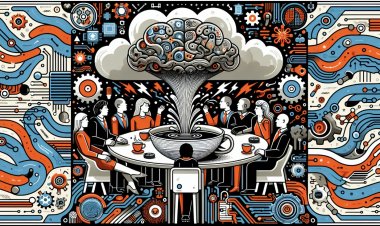The Cannabis Question: Exploring the Benefits and Risks of Cannabis Use
"Dive into 'The Cannabis Question' to explore the multifaceted aspects of cannabis use. This article provides a balanced perspective on the potential benefits and risks associated with cannabis, delving into medical research, societal impacts, and the evolving legal landscape surrounding its use."

Introduction: The Cannabis Divide
The cannabis industry has undergone a significant transformation in recent years, moving from an illicit market to a legal and regulated industry. This shift has created a stark divide among people's opinions and beliefs about cannabis. While some view it as a beneficial medicine, others see it as a dangerous substance that can lead to addiction and negative health consequences. In this section, we will explore the different aspects of the cannabis divide, including its legalisation, medical use, and the issue of cannabis-related arrests.
Overview of the Cannabis Industry and its Legalisation
The cannabis industry has become a multi-billion dollar industry, with more and more states legalising its use for both medical and recreational purposes. However, despite its growing acceptance, cannabis remains illegal at the federal level in the United States, which creates a complex legal landscape. The legalisation of cannabis has sparked debates and discussions about its benefits and risks and has led to varying regulations and policies across different states.
Discussion on the Medical Use of Cannabis
One of the key arguments for the legalisation of cannabis is its potential medical benefits. Many people use cannabis to alleviate the symptoms of various medical conditions, including chronic pain, epilepsy, and anxiety. Research and anecdotal evidence both support the use of cannabis for medical purposes, but more studies are still necessary to fully understand its efficacy and safety.
Highlighting the Issue of Cannabis-Related Arrests
While cannabis is becoming increasingly accepted and accessible, there are still a significant number of cannabis-related arrests happening in the United States. In fact, someone gets arrested for cannabis every 58 seconds. The enforcement of cannabis laws disproportionately affects marginalised communities, leading to racial disparities in arrests and incarceration rates. This raises important questions about the fairness and effectiveness of current drug policies.
Overall, the cannabis divide is a complex and multifaceted issue that encompasses legal, medical, and social aspects. It is essential to have open and informed discussions about cannabis to ensure that policies and regulations are based on accurate information and prioritise the well-being of individuals and communities.
The science of cannabis
The use of cannabis has become increasingly prevalent, and as its popularity grows, so does the need for a better understanding of the science behind it. In this section, we will explore the fascinating world of cannabis, focusing on the endocannabinoid system, the different chemicals found in cannabis, and the impact of THC on neuroscience.
The Endocannabinoid System and Its Role in the Body
The endocannabinoid system is a complex network of receptors and molecules found throughout the body. It plays a crucial role in regulating various physiological processes, including sleep, mood, appetite, pain sensation, and immune function. The endocannabinoid system consists of two main types of receptors, known as CB1 and CB2, which are primarily located in the brain and immune cells, respectively. These receptors support general well-being and aid in maintaining homeostasis when cannabinoids activate them.
The Different Chemicals Found in Cannabis
Cannabis contains over 400 chemicals, including cannabinoids, terpenes, and flavonoids. The most well-known and studied cannabinoids are THC (tetrahydrocannabinol) and CBD (cannabidiol). THC is the psychoactive compound responsible for the "high" associated with cannabis use, whereas CBD does not produce intoxicating effects. Other cannabinoids, such as CBG (cannabigerol) and CBN (cannabinol), have also gained attention for their potential therapeutic properties.
-
THC: Known for its psychoactive effects, THC has been extensively studied for its impact on the brain. It binds to CB1 receptors, leading to changes in cellular behaviour and influencing various cognitive processes.
-
CBD: CBD has gained popularity for its potential therapeutic benefits, including its anti-inflammatory, analgesic, and anxiolytic properties. It interacts with multiple receptors in the endocannabinoid system, as well as other neurotransmitter systems.
-
CBG and CBN: While less studied than THC and CBD, CBG and CBN have shown promise in preliminary research. CBG may have anti-inflammatory and neuroprotective effects, while CBN may have sedative and analgesic properties.
THC and Its Impact on Neuroscience
The discovery of THC and its effects on the brain marked a significant milestone in neuroscience. THC binds to CB1 receptors in the brain, leading to alterations in neurotransmitter release and cellular communication. This interaction can affect cognitive processes, including memory, attention, and mood. Researchers continue to study the impact of THC on the brain and its potential therapeutic uses, as well as the potential risks associated with its use.
Understanding the science of cannabis, including the endocannabinoid system and the different chemicals found in cannabis, is essential for making informed decisions about its use. While cannabis offers potential benefits, it is important to consider individual factors, such as age, genetics, and overall health, as well as consult with healthcare professionals to ensure safe and responsible use.
Benefits and Risks of Cannabis Use
When it comes to cannabis use, there are potential benefits for various conditions, but there are also risks and potential harm to be aware of. It's important to understand the right dose and identify who should and shouldn't use cannabis.
Exploration of the Potential Benefits of Cannabis for Various Conditions
Many people use cannabis to alleviate the symptoms of various medical conditions, including chronic pain, epilepsy, and anxiety. The use of cannabis for medical purposes is supported by research and anecdotal evidence. For example, some individuals with post-traumatic stress disorder (PTSD) have found relief from their symptoms through the use of cannabis. Additionally, CBD, a non-psychoactive compound found in cannabis, has gained popularity for its potential therapeutic benefits, such as anti-inflammatory, analgesic, and anxiolytic properties. However, it's important to note that more scientific studies are needed to fully understand the effectiveness and safety of cannabis for different conditions.
Discussion on the Risks and Potential Harms of Cannabis Use
While cannabis can offer potential benefits, it's important to be aware of the risks and potential harm associated with its use. Regular or daily use of cannabis can lead to dependence and addiction, with about 9% of users developing a cannabis addiction. This can result in withdrawal symptoms, impaired memory, mood disturbances, and difficulties with motivation. Cannabis use can also affect brain development, particularly in adolescents, as the brain undergoes significant changes during this time. Long-term or heavy use of cannabis can disrupt the pruning of synapses in the brain, potentially affecting cognitive abilities and increasing the risk of mental health issues.
The importance of understanding the right dose and identifying who should and shouldn't use cannabis
Understanding the right dose is crucial when using cannabis, as too much or too little can have different effects. Each individual may have a different tolerance and response to cannabis, so it's important to start with a low dose and gradually increase if needed. It's also important to consider individual factors, such as age, genetics, overall health, and any potential drug interactions, when using cannabis. Additionally, certain groups of people, such as pregnant women and individuals with a history of substance abuse or mental health disorders, may be advised to avoid cannabis use due to potential risks.
In conclusion, cannabis use can offer potential benefits for various conditions, but it's important to understand the risks and potential harm associated with its use. Finding the right dose and identifying who should and shouldn't use cannabis is crucial for safe and responsible use.
The medical potential of CBD
Cannabidiol (CBD), a compound found in cannabis, has gained significant attention for its potential medical benefits. Here, we will explore the medical potential of CBD, including its use in treating epilepsy, through case studies and the importance of scientific research and FDA approval for CBD products.
Case Studies of Individuals Using CBD for Medical Purposes
There have been numerous case studies showcasing the positive effects of CBD on individuals with various medical conditions. One such case is that of Evelyn Nussenbaum's son, who had a devastating form of epilepsy. CBD provided her son with a new lease on life, reducing the frequency and severity of his seizures. Other case studies have shown CBD to be effective in alleviating symptoms of chronic pain, anxiety, and post-traumatic stress disorder (PTSD).
Discussion on the Role of CBD in Treating Epilepsy
Epilepsy is a neurological disorder characterised by recurrent seizures. CBD has emerged as a potential treatment option for epilepsy, particularly for those who do not respond well to traditional medications. Research and anecdotal evidence suggest that CBD can reduce the frequency and severity of seizures in individuals with epilepsy. The FDA has even approved a CBD-based drug, Epidiolex, for the treatment of certain types of epilepsy.
The importance of scientific research and FDA approval for CBD products
While CBD shows promise as a medical treatment, it is crucial to conduct rigorous scientific research to fully understand its effectiveness and safety. Clinical trials and studies are needed to establish appropriate dosages, identify potential side effects, and determine which medical conditions CBD is most beneficial for. Furthermore, FDA approval is essential to ensure that CBD products meet quality and safety standards, providing consumers with reliable and effective options.
In conclusion, CBD holds significant medical potential for a wide range of conditions. Case studies have demonstrated its efficacy in treating epilepsy, chronic pain, anxiety, and PTSD. However, further scientific research and FDA approval are necessary to fully unlock its medical benefits and ensure the safety and quality of CBD products.
Understanding Cannabis Addiction and Withdrawal
While cannabis is often touted for its potential benefits, it's important to understand that it can also be addictive, and individuals can experience withdrawal symptoms when they stop using it. In this section, we will delve into the addictive potential of cannabis, explain the withdrawal symptoms, and provide an overview of the research on treating cannabis addiction.
Discussion on the Addictive Potential of Cannabis
Contrary to popular belief, cannabis can be addictive. Approximately 9% of cannabis users develop a cannabis addiction. The addictive potential of cannabis is primarily due to the presence of THC, the psychoactive compound responsible for the "high" associated with cannabis use. THC binds to cannabinoid receptors in the brain, leading to changes in cellular behavior and influencing various cognitive processes. Regular or daily use of cannabis can lead to dependence, where individuals experience cravings and a strong desire to continue using cannabis despite negative consequences.
Explanation of Cannabis Withdrawal Symptoms
When someone dependent on cannabis stops using it, they may experience withdrawal symptoms as their body adjusts to the absence of the drug. Cannabis withdrawal symptoms can vary in severity and duration, but may include:
-
Irritability and mood swings
-
Insomnia
-
Decreased appetite
-
Restlessness and anxiety
-
Depression
-
Headaches
-
Nausea and gastrointestinal discomfort
These symptoms typically peak within the first week of abstinence and gradually subside over time. It's important to note that not everyone who stops using cannabis will experience withdrawal symptoms, and the severity and duration of symptoms can vary from person to person.
Overview of Research on Treating Cannabis Addiction
Research on treating cannabis addiction is still limited, but there are some promising approaches. Cognitive-behavioural therapy (CBT) has shown effectiveness in helping individuals overcome cannabis addiction by addressing underlying psychological factors and teaching coping strategies to manage cravings and withdrawal symptoms. Motivational interviewing, a counselling technique that focuses on increasing motivation and commitment to change, has also shown promise in treating cannabis addiction. Additionally, medications such as synthetic cannabinoids and anandamide enhancers are being explored as potential treatment options, but more research is needed to determine their effectiveness.
In conclusion, it's crucial to recognise that cannabis can be addictive and that individuals may experience withdrawal symptoms when they stop using it. Understanding the addictive potential of cannabis and the associated withdrawal symptoms can help individuals make informed decisions about their cannabis use and seek appropriate support and treatment if needed.
The Social and Legal Impact of Cannabis
Cannabis-related arrests and incarceration rates have highlighted significant racial disparities within the criminal justice system. Despite the increasing acceptance and accessibility of cannabis, marginalised communities, particularly black individuals, are disproportionately affected by the enforcement of cannabis laws. This raises important questions about the fairness and effectiveness of current drug policies.
The history of cannabis criminalization dates back to the early 20th century, when it was demonised and associated with racial stereotypes and xenophobia. Harry Anslinger, the head of the Bureau of Narcotics, fueled racial prejudice by linking cannabis to Mexican immigrants and spreading fear about its use. This led to the passage of the Marijuana Tax Act in 1937, effectively criminalising cannabis at the federal level.
Since then, the war on drugs, launched in the 1970s by President Richard Nixon, has disproportionately targeted communities of colour, leading to mass arrests and incarceration for cannabis-related offenses. This punitive approach has had a devastating impact on individuals and communities, perpetuating cycles of poverty, loss of employment, and limited access to education and housing.
It is time to reassess drug policies and prioritise harm reduction and social equity. Many advocates and activists argue for the end of the war on drugs and the legalisation of cannabis. Legalisation would not only reduce the burden on the criminal justice system but also create opportunities for economic growth and social justice.
By legalising cannabis, we can regulate its production, distribution, and use, ensuring product safety, quality, and responsible consumption. Legalisation would also generate tax revenue that can be reinvested in education, healthcare, and community development programmes, benefiting all members of society.
Furthermore, legalising cannabis would allow for scientific research and evidence-based policymaking. We need comprehensive studies to fully understand the potential benefits and risks of cannabis use, as well as its medical applications. This research would inform public health campaigns, education initiatives, and regulations to ensure safe and responsible cannabis use.
It is time to address the social and legal impact of cannabis by ending the war on drugs and embracing a more progressive and evidence-based approach. By legalising cannabis and implementing equitable policies, we can create a more just and inclusive society that prioritises the well-being and rights of all individuals.
The Future of Cannabis as a Medicine
The future of cannabis as medicine holds great potential, but it is important to approach it with caution and continued research. Here are some key points to consider:
The importance of further research and understanding of cannabis
While cannabis has shown promise in alleviating the symptoms of various medical conditions, including chronic pain, epilepsy, and anxiety, there is still a need for more scientific research. Continued studies are necessary to fully understand its effectiveness, safety, and potential applications in different medical conditions. By conducting comprehensive research, we can gain a better understanding of how cannabis interacts with the body and brain and develop more targeted and effective treatments.
Discussion on the Need for Regulation and Standardised Products
As the cannabis industry continues to grow, there is a need for regulation and standardised products. Currently, there is a wide variability in the quality and potency of cannabis products available on the market. Standardisation and regulation can ensure that products are safe, consistent, and accurately labelled. This will allow healthcare professionals to confidently recommend and prescribe cannabis as medicine and help patients make informed choices about their treatment options.
Addressing the Complexities and Challenges of Cannabis as Medicine
Cannabis as medicine poses unique complexities and challenges. It is important to consider individual factors such as age, genetics, overall health, and any potential drug interactions when using cannabis. Additionally, there is a need to educate healthcare professionals and the public about the potential risks and benefits of cannabis use. By addressing these complexities and challenges, we can ensure the safe and responsible use of cannabis as medicine.
In conclusion, the future of cannabis as medicine holds promise, but it requires further research, regulation, and understanding. Through continued scientific studies, standardised products, and addressing the complexities of cannabis as medicine, we can unlock its full potential and ensure its safe and effective use in treating various medical conditions.
If you don't want to go through the stress of Forex but want to make money, join our Forex Managed Account Programme (links below).
TradeFxP Features
If you choose to be a self-employed retail trader, here are a few things we offer:
-
The best trading platform
-
No Requotes
-
Lowest Spreads
-
High-level liquidity
-
Interbank connectivity
-
Pure STP/DMA/ECN
-
Free signals
-
Best support
-
Crypto Wallet and withdrawals and deposits (USDT)
-
Robust CRM
-
TradeFxP wallet
-
Once you click withdrawal
-
Multiple payment options
-
Local offices to walk into
-
Free VPS
-
Free video chat and virtual meetings
-
And many more...
If you choose to be a part of our managed account programme,
-
All of the above +
-
1-2% Daily Profits
-
High-level risk management
-
Capital protection
-
Only 30% of the capital was used.
-
Negative balance protection
-
Our fee is from the profits only.
-
Monthly profit withdrawal
-
Wallet system: use it like PhonePe or Google Pay.
-
Crypto wallet and withdrawals/deposits (USDT)
-
Live monitoring
-
MyFxbook Live Monitoring
-
Copy Trading
-
And many more...
Optional: If you do not withdraw your profits for 2 months, our system will use those profits to trade and will keep your 100% capital safe and secure for margin purposes. This is optional, and if you choose not to be a part of it, you can withdraw your profits from the first month itself.
Why 1-2% daily? Can't your managed Forex account earn more?
Yes, we can! Remember: greed may be good in the beginning, but in the end, it will destroy everything. You and I know that! Many droplets make an ocean! Join the Managed Account Programme and sit back for six months, then look at your account. You'll see that our strategy is good and the best. Do you know what I mean?
If you choose to be a part of us as an introducing broker (IB) or channel partner,
-
Industry-best rebates
-
Local office support
-
Staff support
-
Marketing support
-
Marketing materials
-
And many more...
Having said that,
You can join our Forex Managed Account programme and earn 1-2% profits daily. See for yourself by clicking the below link.
Have a great journey, and may you catch some big waves on your way to prosperity!
To see Ai Forex Trading for real, use these credentials.
-
Low-risk strategy:
-
Mt4: 112018
-
PW: Allah@101
-
Server: TradeFxP live,
1. To read why you should be with us, click here.
2. To open an account, click here.
3. To see our regulation certificate, click here.
4. To see our news with the IFMRRC, click here.
5. For claims, click here.
6. For the main site, click here.
7. For blogs and articles, click here.
8. Main Website:www.TradeFxP.com



 admin
admin 










